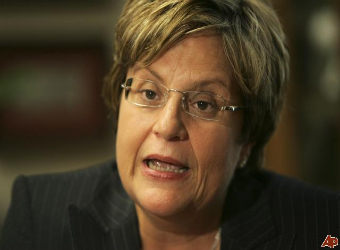The success of Egypt’s democratic transition relies on respect for human rights, upholding the rule of law, and protecting civil society, a US congresswoman said on Tuesday.
Egypt witnessed a steady increase in human rights abuses by the Muslim Brotherhood-led government of toppled Islamist president Mohamed Morsi, Ileana Ros-Lehtinen said.
“There was a precipitous increase in the arrests of journalists, a widespread crackdown on opposition demonstrators, wanton disrespect for the rule of law, and an overall deteriorating state of human rights throughout Egypt,” she said.
Ros-Lehtinen made the remarks at a joint subcommittee hearing on human rights abuses in Egypt on Tuesday.
She also condemned violence by Brotherhood loyalists following Morsi’s ouster by the military in July amid mass protests.
Egypt has been rocked by violent tumult since Morsi’s exit. More than 1,000 have died in street protests, which have largely pitted Islamists against security forces and civilian opponents.
“Muslim Brotherhood supporters have terrorised the Egyptian people with violent protests, and the end result has left hundreds killed and many more injured,” the chairperson of the Middle East and North Africa Subcommittee said.
“The general security situation, restrictions on civil society and a lack of the rule of law and respect for human rights demonstrate that Egypt still has a long way to go toward creating a truly democratic society,” Ros-Lehtinen noted.
She blamed the interim government for failing to provide “adequate protections” for Coptic Christians, who were “scapegoated” by Morsi supporters.
Dozens of churches and Christian-owned properties across Egypt were damaged and torched after police dispersed two pro-Morsi sit-ins in Cairo in August, leaving hundreds dead.
Ros-Lehtinen voiced alarm about the rights of women and minorities in the country’s newly amended charter, finalised last week and due to be put to a referendum in mid-January.
“While the latest draft constitution in theory has provided more rights, in practice it is so left open to interpretation, thus not necessarily affording any more rights to those groups who need protection the most,” she said.
The panel tasked with drawing up the new constitution “was not truly representative of the interests of all Egyptians,” she said, noting that only five women and four Coptic Christians were on the 50-member panel.
“In order for Egypt to return to the path toward democracy, the new constitution must protect the rights of women and religious and ethnic minorities, everyone’s human rights must be recognised, and the political party process must be allowed to take root with free, fair and transparent elections.
“The ideals enshrined in this document must be the bedrock foundation that can inspire a country that is in danger of losing its way.”
Ros-Lehtinen also urged the authorities to pardon 43 NGO workers – including Americans and Europeans – who she said were “unjustly convicted” and sentenced to jail terms earlier this year, and “allow the NGOs to operate without fear of government reprisals as they help to support civil society.”
Egypt’s transition roadmap, set forth by the country’s interim authorities, envisages the constitution to be passed in a referendum in January, with parliamentary elections and a presidential vote to follow by mid-2014.
“Without a strong basis in democracy, any elections will fail to achieve the democratic results we all hope and pray to see in Egypt,” Ros-Lehtinen added.
Source: Ahram Online
